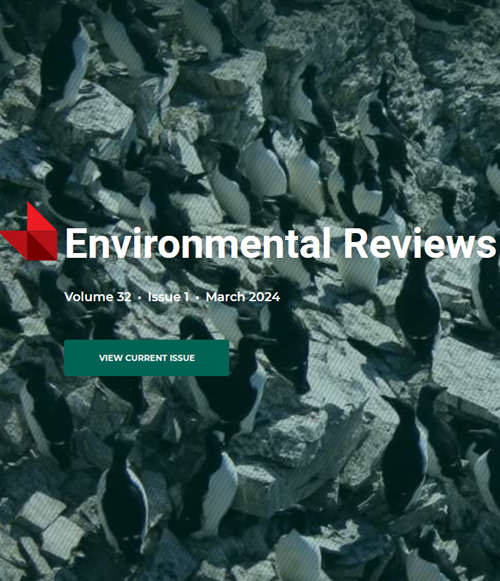道路对湖泊和池塘的影响:知识差距的系统审查和评估
IF 5.1
3区 环境科学与生态学
Q2 ENVIRONMENTAL SCIENCES
引用次数: 5
摘要
随着全球人口的增加,道路网络的扩张导致了陆地和水生栖息地的破坏和干扰。与道路相关的压力源对乳液和扁豆的栖息地都有显著影响。虽然有几篇系统的综述评估了道路对丘陵环境的影响,但没有一篇只考虑道路对丘陵栖息地的影响。我们进行了一项文献综述,以实现两个目标:1)总结道路对慢镜头环境的物理、化学和生物特性的影响;以及2)确定我们目前对道路对扁豆栖息地影响的认识中的偏见和差距,以便我们能够找到未来研究的有希望的领域。我们的综述发现,1970-2020年间发表了172篇论文。最常研究的与道路相关的压力源包括道路盐和重金属污染(分别为67篇和43篇论文)、栖息地破碎化(37篇论文)和景观变化(14篇论文)。这些压力源会导致电导率和氯化物水平的变化,湖泊分层模式的变化,水中和生物体中重金属浓度的增加,以及两栖动物在道路上分散时的显著死亡率。根据搜索结果中出现的频率,我们还确定了各种其他可能研究不足的压力源,包括多环芳烃、道路灰尘、可及性增加、水文变化、噪音污染、抑尘剂、沉降、入侵物种引入和取水。我们的综述表明,已发表的研究存在强烈的地理偏见,57.0%的研究对象是北美网站,30.2%的研究对象为欧洲网站。此外,已发表的文献中存在分类学偏见,大多数研究集中在两栖动物(41.7%)、鱼类(15.6%)和大型无脊椎动物(14.6%),而很少考虑浮游动物(8.3%)、硅藻(7.3%)、变形虫(5.2%)、水鸟(3.1%)、爬行动物(2.1%)和大型植物(1.0%),对于与道路相关的每一种主要压力源,我们都确定了未来研究的有希望的领域。然而,我们推测,纠正我们目前知识的地理和分类学偏见,可以大大提高我们对道路对慢生环境影响的理解,从而更好地为这些重要栖息地的环境管理提供信息。本文章由计算机程序翻译,如有差异,请以英文原文为准。
The effects of roadways on lakes and ponds: a systematic review and assessment of knowledge gaps
As the global population increases, the expansion of road networks has led to the destruction and disturbance of terrestrial and aquatic habitats. Road-related stressors have significant effects on both lotic and lentic habitats. While there are several systematic reviews that evaluate the effects of roads on lotic environments, there are none that consider their effects on lentic habitats only. We conducted a literature review to achieve two objectives: 1) to summarize the effects of roads on the physical, chemical, and biological properties of lentic environments; and 2) to identify biases and gaps in our current knowledge of the effects of roads on lentic habitats so that we could find promising areas for future research. Our review found 172 papers published between 1970-2020. The most frequently studied stressors associated with roads included road salt and heavy metal contamination (67 and 43 papers respectively), habitat fragmentation, (37 papers) and landscape change (14 papers). These stressors can lead to alterations in conductivity and chloride levels, changes in lake stratification patterns, increases in heavy metal concentrations in water and organisms, and significant mortality as amphibians disperse across roadways. We also identified a variety of other stressors that may be understudied based on their frequency of appearance in our search results, including polycyclic aromatic hydrocarbons, road dust, increased accessibility, hydrological changes, noise pollution, dust suppressants, sedimentation, invasive species introductions, and water withdrawal. Our review indicated that there are strong geographic biases in published studies, with 57.0% examining North American sites and 30.2% examining European sites. Furthermore, there were taxonomic biases in the published literature, with most studies focusing on amphibians (41.7%), fish (15.6%), and macroinvertebrates (14.6%), while few considered zooplankton (8.3%), diatoms (7.3%), amoebas (5.2%), water birds (3.1%), reptiles (2.1%) and macrophytes (1.0%). Based on our review, we have identified promising areas for future research for each of the major stressors related to roadways. However, we speculate that rectifying the geographic and taxonomic bias of our current knowledge could significantly advance our understanding of the impacts of roads on lentic environments, thereby better informing environmental management of these important habitats.
求助全文
通过发布文献求助,成功后即可免费获取论文全文。
去求助
来源期刊

Environmental Reviews
环境科学-环境科学
自引率
3.50%
发文量
45
期刊介绍:
Published since 1993, Environmental Reviews is a quarterly journal that presents authoritative literature reviews on a wide range of environmental science and associated environmental studies topics, with emphasis on the effects on and response of both natural and manmade ecosystems to anthropogenic stress. The authorship and scope are international, with critical literature reviews submitted and invited on such topics as sustainability, water supply management, climate change, harvesting impacts, acid rain, pesticide use, lake acidification, air and marine pollution, oil and gas development, biological control, food chain biomagnification, rehabilitation of polluted aquatic systems, erosion, forestry, bio-indicators of environmental stress, conservation of biodiversity, and many other environmental issues.
 求助内容:
求助内容: 应助结果提醒方式:
应助结果提醒方式:


